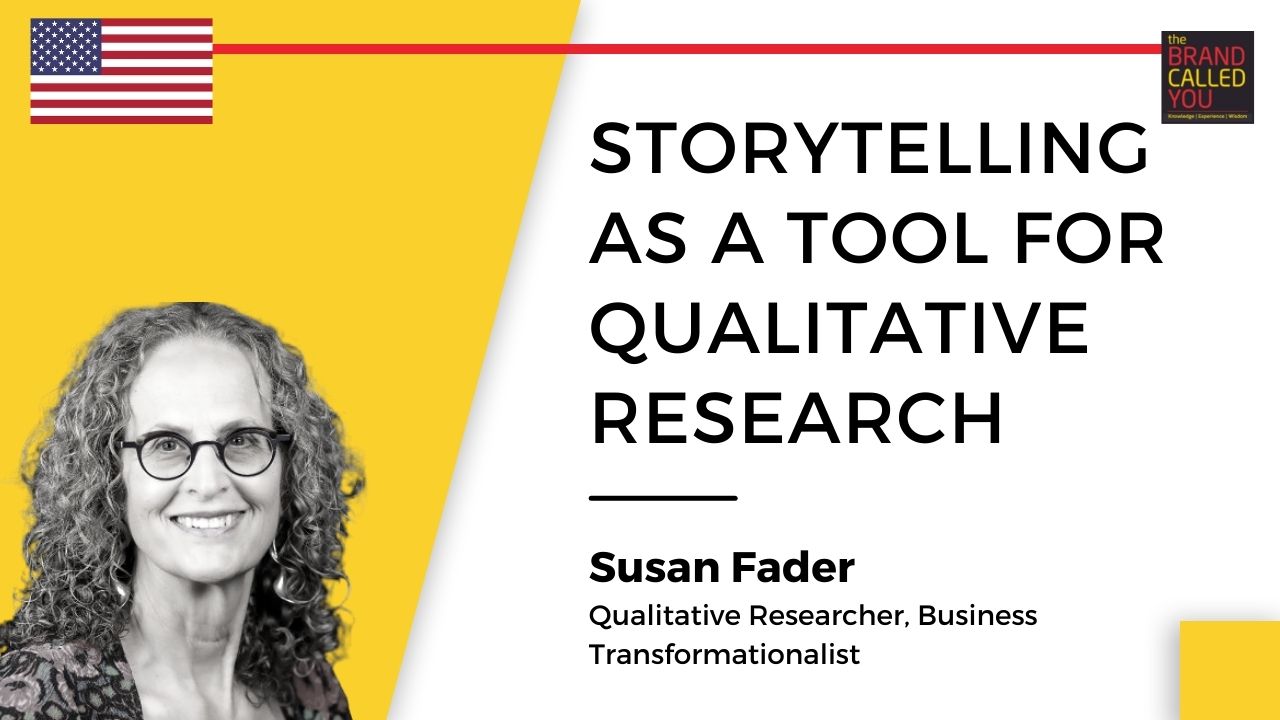Susan Fader, Qualitative Researcher, Business Transformationalist
- She helps companies to rethink their biases, to transcend their data and really access their emotional intelligence.
Podcast
Overview
Cognitive demographics are about how people self-perceive in the value hierarchy. And then also how they perceive their role. Besides traditional demographics, it is more important than ever to understand cognitive demographics at this time. It is also equally important to learn about the context of why people like or dislike a product or advertisement idea.
Today’s guest, Susan Fader, is a qualitative researcher and business transformation analyst. She talks about storytelling as a tool for qualitative research. She also talks about cognitive demographics and why is it so important to better understand the consumer.
00:08- About Susan Fader
- Susan is a qualitative researcher and business transformation analyst.
- She helps companies to rethink their biases, to transcend their data and really access their emotional intelligence.
- She’s not only contributing to a host of industry publications, and she’s a hugely sought-after speaker at conferences, but she’s now expanded her work to include business consulting uniquely.
03:03- Have you always used storytelling to really transcend facts?
- It has been an evolution for me. Research is very structured; you have categories, like putting horse blinders on.
- Traditionally the conversation is guided, but if the people decide where to start, they are contextualizing. They decide what words adjectives, adverbs they’re going to use, you’re going to see what they leave out, you’re going to see what they add.
- So, if they start with a story, they are contextualizing. And therefore, you can have a conversation based off of how they perceive the world.
09:33- Do you look beyond the object to something more emotionally meaningful?
- The emotional component is so important. And that tends to get lost when businesses are laser focused on getting answers and asking questions.
- But you get the emotion when the person tells a story, and it kind of brings them into the situation.
- People need to be in the right frame of mind of what really is going to solve my problem. Only then can they give the best answers.
12:31- Is it shocking for companies that your insights are actually more accurate?
- In the world of research, people are focusing on data gathering, that we’re going to get a bunch of information, then we’ll figure it out.
- And for me, dislike storytelling is so significant. The ability to listen is very significant. And people don’t listen and don’t observe.
- The beauty of having people tell you a story and not asking a question, not assuming you know the answer, observing, and also listening can uncover something that you were not even looking for.
16:24- What is cognitive demographics?
- Traditional demographics, is age, how frequently they buy it, whether they’re in a relationship or have children and what’s their income, which are very important.
- But the way companies’ segment might not be the way people self-perceive. And the way people self-perceive, and how they affiliate with other people they see as their own, determines how they’re going to make a decision.
- It’s about how they self-perceive in the value hierarchy. And then also how they perceive their role.
24:52- What you’re up to in business consulting?
- Sometimes I suggest spending a week or two just contextualizing and getting clarity.
- I have had clients who are having me come in and just help them strategize, just to contextualize what it is because you have so many stakeholders and stakeholders have different needs, they speak different languages.
- Clarity is very significant in any discussion. I do a two-step with taxonomy. I say, I want people to define it first. Then I define it. And then I clarify.
29:35- Are you working on any new publications now?
- I just had an article published in the July issue of Quirks magazine, which is the largest market research magazine in, that was in content on contextual intelligence.
- A marathon runner never runs the race the same, you have to think about the weather, you have to think about all the stuff so that this article goes into great detail of contextualizing your event.
- A lot of times people just assume what we do before we can carry, but you have to keep refreshing your baseline assumptions.
RESOURCES:
Enjoy this podcast?
If you learned new insights about storytelling, subscribe and share it with friends!
Love to give us 5 stars? ⭐⭐⭐⭐⭐ If you do, we’d love a review from you. Help us reach more people to keep them in the know as we talk to leaders, high achievers, and thought leaders from diverse backgrounds and nationalities. Excellence can come from anywhere; stay in the know, and hear from emergent high achievers and gurus.
Stay updated with what’s shaping the world today through the latest The Brand Called You Podcast episode. Follow us on iTunes, Spotify, and Anchor.fm.
Don’t forget to follow and message us on these platforms!
Website: https://tbcy.in/
Facebook: https://www.facebook.com/followtbcy
LinkedIn: https://www.linkedin.com/company/tbcy/
Twitter: https://twitter.com/followtbcy
YouTube: https://www.youtube.com/c/followtbcy
Thanks for listening!
Profile
Part gentle contrarian, part unorthodox iconoclast, part coach, and spirit guide, for decades I have been helping clients get “unstuck” by thinking differently about the most mission-critical challenges that are impacting their business objectives.
Many business challenges start out of focus. My Counterintuitive approach to evidence-based brand and research consultancy helps companies think differently about their strategic objectives.


